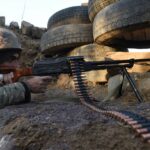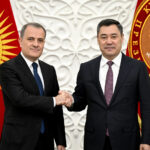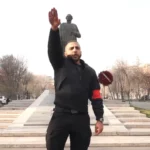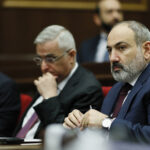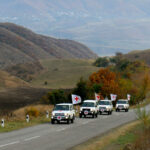From the first day of the Patriotic War, the Victorious Commander-in-Chief said “no-one can stop us”. He fought not only on the battle field, but also on the information front and on the level of diplomacy, and got the upper hand in all three.
What did the Karabakh Victory change? We didn’t only achieve this Victory by liberating our lands. Azerbaijan and its leader rose to a much higher prominence in the eyes of the world, the attitude towards our country changed by 180 degrees. The whole world saw that you can’t talk to Azerbaijan and its President in the language of force. Azerbaijan is no longer what it used to be 30 years ago. Its reputation and the weight of its words have increased a multiple times, especially after the Karabakh Victory. World powers are now reckoning with us. President Ilham Aliyev is dictating the agenda of the post-war period in our region. The Brussels negotiations, the Prague and Sochi meetings are clear evidence of that. The fact that major powers and leading international organizations have unequivocally accepted the geopolitical realities of the region created by the Patriotic War is a clear indication of this.
The Karabakh Victory is, at the same time, a victory of justice, a celebration of the right cause. Azerbaijan, which has itself implemented the four resolutions of the UN Security Council that had remained on paper for 30 years, has resolutely rejected the mediation mission of the OSCE. Why? What did the Minsk Group, which represents the world’s three superpowers and three of the five members of the Security Council – the United States, Russia and France – do over these decades? What was it able to change? On the contrary, it turns out that their goal was not to resolve the conflict, but to perpetuate the fact of occupation. Attempts to revive the Minsk Group and re-enter it into the circulation are still being observed. What does our president say? No way, we already have enough power to protect our rights and put the revanchists back where they belong. Recently, our Army has been duly responding to every provocation of the Armenian side, showing that there is no point in any revanchist sentiments.
The road leading to the Patriotic War and the Karabakh Victory took only 44 days. But what is behind this glorious Victory? It is based on the strategy of victory laid out by great leader Heydar Aliyev, the years of patient, tireless and wise struggle of President Ilham Aliyev, the thoughtful steps taken according to the requirements of the time, and timely diplomatic moves. If things had been left to Armenia, the issue would have been resolved much earlier and easier. It had neither economic nor military power to stand in front of us. It only relied and depended on its patrons. Who they are is clear as day. Some, such as France and Iran, support it openly. But there are also those who do it covertly.
When the war started, there was hardly anyone left Nikol Pashinyan didn’t call, asking for help and begging them to stop Azerbaijan. Our president bravely resisted all the pressures, showed a position of principle and determination, and said his words directly: No-one, no force can stop us. We will go to the end.
And so it happened. It has been two years since the longing for Karabakh ended and the stigma of a defeated nation was removed from Azerbaijan. For two years now, we have been able to hold our head high and our forehead open.
Even in the first years of election as head of state, our President foresaw that Armenia would collapse from a political and economic point of view. By saying this, he called on the neighbors to take the right path: you will be the losing side and we will only go forward.
Azerbaijan’s position is fair, time is on our side, and so is international law. The sooner the opposite side understands this, the better for them (meeting at the French Institute of International Relations, 23 January 2004).
The head of state saw that the negotiations conducted with the mediation of the Minsk Group were nothing but an imitation of talks. This situation – the status quo – could not last forever. One day, Pashinyan even said: “Karabakh is Armenia, period.” This actually meant an end to the negotiations. What did our president say? “Karabakh is Azerbaijan, an exclamation mark!”
President Ilham Aliyev first spoke these words, which now seem to have been memorized by everyone, 18 years ago – on 29 April 2004 – during a press conference in the European Palace in Strasbourg, sending a message to Armenia and its defenders.
Azerbaijan’s position is clear and has been stated many times. If you haven’t had the opportunity to get acquainted with these statements, let me remind you: Nagorno-Karabakh is the territory of Azerbaijan. Azerbaijan will never agree to the independence of Nagorno-Karabakh or it becoming a part of Armenia. Nagorno-Karabakh is Azerbaijan!
If we look at world history, we will see that even famous generals were wrong in their calculations and lost wars. It is not only about military strength and the number of troops at your disposal. While these are certainly important factors, the timing and moment must be right. We remember the words of great leader Heydar Aliyev many years ago: “We will return to Karabakh, we will definitely return it, it will just take time.”
At the time, some viewed it a consolation. In reality, however, far-sighted Heydar Aliyev seemed to have foreseen this day years ahead and sincerely believed that Karabakh would be liberated. He did not accidentally say that Ilham Aliyev would complete the work he had started. The Patriotic War was vivid proof of this.
The Patriotic War of the Azerbaijani people and the conquest of Shusha are a rare occasion in modern military history, a unique phenomenon in many ways. I can recall some others off the top of my head:
– The Azerbaijani Army broke through the fortified defenses built by the enemy in 30 years in a matter of three to four days.
– While there were 10,000 deserters in the Armenian army, not a single of our soldiers ran from the battlefield.
– Children who left Karabakh in their mother’s arms and barefooted returned to their homeland on tanks.
– The Shusha operation, the culminating point of the Karabakh Victory, was inscribed in the military history of the world.
– Maximum results were achieved with minimum losses in the conditions of difficult natural terrain.
– The unity of the People, President and the Army turned into an Iron Fist and broke the enemy’s back…
There are written and unwritten laws of war. An army against an army, a soldier against a soldier, face to face, man to man. Whoever is strong gets the upper hand. This is exactly how Azerbaijan fought the war. What did Armenia do? It targeted civilians, fired ballistic missiles at Ganja, Barda and Tartar, killing hundreds of civilians, children, and women. Azerbaijan had even more powerful weapons at its disposal to hit Yerevan, if it wanted. Our Victorious Commander-in-Chief didn’t think it right. Instead, our Army took the revenge for the martyrs and innocent civilian victims on the battlefield. He showed the world again who is who.
The immeasurable services of First Vice-President Mehriban Aliyeva in the Karabakh Victory are also remembered with a feeling of gratitude. Mrs. Mehriban Aliyeva, the closest and most loyal comrade-in-arms of President Ilham Aliyev, gave strong political and moral support to the struggle for the liberation of our lands. All of her appeals to the people and calls for national solidarity echoed in people’s hearts and impressed everyone. Her prayers during the war were accepted and Allah granted us the happiness of embracing the Karabakh land.
Immediately after the Patriotic War, the Heydar Aliyev Foundation began the restoration of historical and religious monuments in Shusha and other liberated lands on the initiative of Mrs. Mehriban Aliyeva. This noble initiative gave a strong impetus to construction work in Karabakh and Eastern Zangazur and amassed many followers.
After World War II, in October 1945, the 50 most powerful countries got together to establish an organization called the United Nations (UN) (currently, the mandate of this organization covers more than 190 countries, or 80 percent of the Earth’s territory). The borders of each state were defined and the UN declared their inviolability. The goal was that no state should lay eyes on another’s territory or occupy another country’s lands. In diplomatic terms, the main mission of the UN is the peaceful settlement of conflicts, the preservation of international peace and security through the adoption of collective decisions.
But how is the UN fulfilling this mission? Four resolutions of the UN Security Council demanding an unconditional withdrawal of the Armenian armed forces from the occupied territories of Azerbaijan (Resolutions No. 822, 853, 874 and 884) remained on paper for almost 30 years. However, a number of other similar resolutions were implemented even before the ink could dry up on them. For example, the international community reacted very harshly to Iraq’s invasion of Kuwait 32 years ago. The Security Council adopted a resolution demanding an immediate withdrawal of Iraqi troops from the territory of Kuwait. Saddam Hussein ignored it. What happened next? Less than half a year after the adoption of the resolution, the United States, one of the main speakers at the UN, launched Operation Desert Storm and drove the Iraqi army out of Kuwait in a matter of 40 days.
Why? Because Washington had made major investment and was pursuing strategic goals in Kuwait. But how did the international community, the United States, approach Armenia’s occupation of 20 percent of Azerbaijan’s territory? Resolutions, decisions and statements no-one cared about but us…
We wanted justice for Karabakh and Khojaly for many years. With the exception of a handful of American states, the international community remained tight-lipped.
The US has not made as much investment in Azerbaijan as it has in Kuwait. But what about justice and international law? America and France, which recognize the fictional Armenian genocide that allegedly took place a hundred years ago but there is still no evidence of it, do not want to recognize the Khojaly massacre committed before the eyes of the whole world.
Or let’s take the OSCE, its Minsk Group. We can still see what Armenia has done to the lands it occupied by wiping hundreds of our towns and villages off the face of the earth. Aghdam is described as the Hiroshima of the Caucasus. Only Aghdam? Jabrayil, Gubadli, Zangilan, Kalbajar, Lachin, Fuzuli are in the same state. Armenians didn’t leave a single building there, they leveled everything to the ground.
Just two years ago, we were unaware of the devastation. But the Minsk Group of the OSCE, its co-chairs from the USA, Russia and France had been shuttling back and forth for 30 years, fully aware of what was happening. They saw it all but stayed silent.
Did anyone stand up and say that the occupation and vandalism should be stopped? The UN, the OSCE did not put any pressure on the occupier, on Armenia, which supports terrorism at state level, treating the brutal crime of genocide coldly and as someone else’s problem. As a result, the invader and the occupied country were treated in the same manner.
There is no concept of big or small, strong or weak states in international law. Every sovereign country has equal rights. In reality, we are seeing the opposite. The events surrounding Ukraine are the latest example. Notice that all Western and NATO countries, including the United States, have stood up. Sanctions unprecedented in world history are being applied against Russia. But not a single sanction was applied against Armenia, which had kept Azerbaijani lands under occupation for nearly 30 years. Not a single effective step was taken to stop the aggressor. If it hadn’t been for such step-parenting, the conflict would not have lasted for 30 years and the situation would not have reached this point.
Despite the obvious double standards and discrimination, President Ilham Aliyev was able to resolutely overcome all the obstacles with his wise policy and forward-looking decisions.
In the present-day world, it is not international law and justice, but the power factor that is at the forefront – if you are strong, you are reckoned with, but if you are weak, you are ignored. Considering this bitter reality, the President set the goal of turning Azerbaijan into a strong and powerful state. He strengthened the army in every possible way and organized consistent, tireless and thoughtful work at the level of diplomacy. As years passed, Azerbaijan became stronger and more powerful, a factor to reckon with in the world. What the Great Leader said with amazing foresight many years ago was ripe in the fall of 2020. The President of Azerbaijan and Commander-in-Chief of the Armed Forces Ilham Aliyev pulled out of pointless negotiations and ordered the army to launch an attack. This was done on the heels of the aggressor Armenia making public statements about “a new war for new territories”, orchestrating incessant provocations on the border and near the occupied territories. The President gave a clear and explicit answer to those who believed that “war wasn’t an option”: we will liberate our lands at any cost.
And so it happened. The concept of a “strong Azerbaijan – strong Army” produced a tangible result. Our people, who started the Patriotic War under the leadership of the Victorious Commander-in-Chief Ilham Aliyev, our brave Army put an end to the occupation and restored justice. We restored it on our own, without any help from the outside. Our lands were liberated by military and political means. In 44 days, the head of state gave up to 30 interviews to foreign media and influential TV channels, conveying to the world the truth about the causes of the conflict, as well as the fair and just position of Azerbaijan.
This in itself is a unique phenomenon in the history of modern conflicts and wars.
Aslan Aslanov is the Chairman of the Board of AZERTAC, Vice President of OANA, member of the News Agencies World Council and the Executive Council of the Union of OIC News Agencies (UNA).


